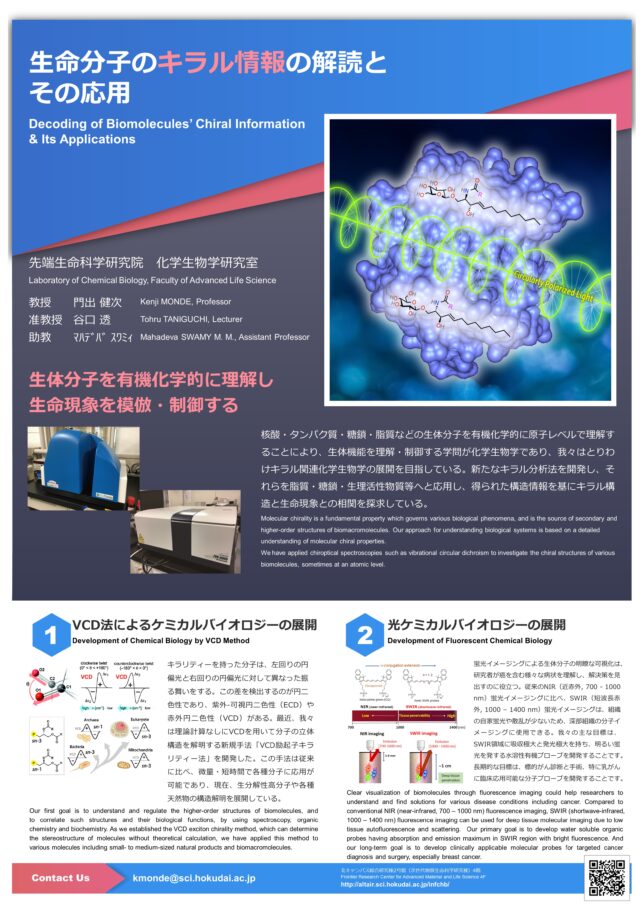Laboratory of Molecular Chemical Biology
- Research Theme
- Three-dimensional structural analysis of biological molecules by vibrational circular dichroism (VCD) spectrum / Creation of disease related molecules by lipid chemical biology
- Research Keywords
Chemical Biology, Chirality, Organic Synthesis, Inhibitors, Vibrational Circular Dichroism, Helix, Lipid Mediator, Glycoconjugate, Medicinal Chemistry, Organic Probe Synthesis, Deep Tissue Imaging, Extracellular vesicle
Staff
-
MONDE Kenji Professor
-
TANIGUCHI Tohru Associate Professor
-
YUYAMA Kohei Specially Appointed Associate Professor
-
SWAMY Mahadeva M. M. Assistant Professor
-
JIN Takashi Visiting Professor
-
SAKAMOTO Noriyasu Visiting Professor
-
ANETAI Masaki Visiting Professor
Overview of Research and Education
Research Contents: Molecular chirality is a fundamental property which governs various biological phenomena, and is the source of secondary and higher-order structures of biomacromolecules. Our approach for understanding biological systems is based on a detailed understanding of molecular chiral properties. In contrast to proteins, the conformation and topology of nucleic acids, carbohydrates and lipids have not been extensively studied in current biology. We have applied chiroptical spectroscopies such as vibrational circular dichroism to investigate the chiral structures of various biomolecules, sometimes at an atomic level. Our first goal is to understand and regulate the higher-order structures of biomolecules, and to correlate such structures and their biological functions, by using spectroscopy, organic chemistry and biochemistry.
Our second topics is sphingolipid chemical biology. Sphingolipids constitute a class of lipids defined by their eighteen carbon amino-alcohol backbones. Sphingolipids are one of main membrane components, and play important roles in signal transmission and cell recognition. We are constructing sphingoid lipid chemical library in order to discovery of new inhibitors of enzymes toward lipid related diseases such as obesity, Alzheimer’s disease, atopic dermatitis, cancer and etc. Utilizing theses novel inhibitors, we study for identification of binding mode between ligand/inhibitor and protein through developing novel chemical biological technologies such as photo affinity labelling. Our second goal is developing novel innovative chem-biological tools, which contribute to the lipid chemical biology leading to new type of drugs.
Laboratory of Molecular Chemical Biology(PDF)
Practical Subjects
Charge
- Charge (US):
School of Science, Biological Science course (Macromolecular Functions), Core Laboratories - Charge (GS):
Graduate School of Life Science, Division of Life Science, Transdisciplinary Life Science Course, Biomaterials Science
Contact
- Address
- 〒001-0021
N21, W11, Kita-ku, Sapporo - Phone
- 011-706-9041
- Fax
- 011-706-9540
- kmonde*sci.hokudai.ac.jp (Please replace * with @ when sending e-mail.)
Representative Publications
Mahadeva M. M. Swamy, Yuta Murai, Kenji Monde, Setsuko Tsuboi, Aravind K. Swamy, Takashi Jin, Biocompatible and water-soluble shortwave-infrared (SWIR) emit-ting cyanine-based fluorescent probes for in vivo multiplexed molecular imaging. ACS Appl. Mater. Interfaces (2024) in press.
Taniguchi, T., Suzuki, T., Satoh, H., Shichibu, Y., Konishi, K., Monde, K., Preparation of Carbodiimides with One-Handed Axial Chirality, J. Am. Chem. Soc., 140, 15577-15581 (2018)
Swamy, M. M. M., Murai, Y., Ohno, Y., Jojima, K., Kihara, A., Mitsutake, S., Igarashi, Y., Yu, J., Yao, M., Suga, Y., Anetai, M., Monde, K., Structure-inspired design of a sphingolipid mimic sphingosine-1-phosphate receptor agonist from a naturally occurring sphingomyelin synthase inhibitor, Chem. Commun., 54, 12758 – 12761, (2018)
Gowda S. B., Nakahashi A., Yamane, K., Nakahashi, S., Murai, Y., C. Siddegowda, A. K., Hammam M. A. S., Monde, K., Facile Chemoselective Strategy toward Capturing Sphingoid Bases by Unique Glutaraldehyde Functionalized Resin, ACS Omega, 3, 753-759 (2018)
Kato, M., Hammam, M. A. S., Taniguchi, T., Suga, Y., Monde, K., What Is the True Structure of D609, a Widely Used Lipid Related Enzyme Inhibitor?, Org. Lett., 18, 768-771 (2016)
Taniguchi, T., Manai, D., Shibata, M., Itabashi, Y., Monde, K., Stereochemical Analysis of Glycerophospholipids by Vibrational Circular Dichroism., J. Am. Chem. Soc., 137, 12191–12194 (2015)
